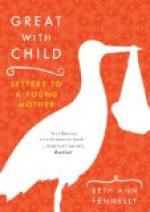But since parents and nurses are not so well qualified as physicians to make these observations, I will endeavor to point out a few certain signs and symptoms by which they may know a child’s health to be declining, even before be appears to be sick.—For if these are neglected, the evil increases, goes on from bad to worse, and more violent and apparent complaints will follow, and perhaps end in incurable diseases, which a timely remedy, or a slight change in the diet and manner of life, would have infallibly prevented.
“The first tendency to disease,” says Dr. Cadogan, “may be observed in a child’s breath. It is not enough that the breath is not offensive; it should be sweet and fragrant, like a nosegay of fresh flowers, or a pail of new milk from a young cow that feeds upon the sweetest grass of the spring; and this as well at first waking in the morning, as all day long.” [Footnote: Buchan’s “Advice to Mothers,” pages 337, 388]
There is much of truth in these remarks; but if they are wholly true, then very few children are perfectly healthy. For no child that eats much animal food of any sort, or, what amounts to nearly the same thing, much butter or gravy, will long retain the fragrant breath here alluded to. Who has not observed the difference in this respect, between animals in general which feed on flesh, and those which feed on grass? And whether it is the character of their respective food that makes the difference or not, it is also true that there is nearly as much difference of breath between men who use animal food and those who do not, as between other animals. The breath of some of our enormous meat eaters would almost remind one of a slaughter house.
Nor is it the quality of food alone, that will induce a foul breath, either in adults or infants. He who swallows such enormous quantities, even of plain food, as by overloading and fatiguing the stomach, tend gradually to debilitate it, will produce the same effect. The enormous feeders of this full feeding country, whether they are young or old, whether they inhabit the mountain or the vale, and whether they feed on animal food or not, have generally a bad breath; and if they seldom offend, it is because few feed otherwise. And it is not too much—in my own opinion—to say of this whole class of gormandizers, no less than of the flesh eaters, that they have laid for themselves the foundation of future disease.
One general rule may here be distinctly laid down. As a child’s breath becomes hot and feverish, or strong, or acid, we may be certain that “digestion and surfeit have fouled and disturbed the blood; and now is the time to apply a proper remedy, and prevent a train of impending evils. Let the child be restrained in its food. Let it eat less, live upon milk or thin broth for a day or two, and be carried (or walk if it is able) a little more than usual in the open air.” [Footnote: Advice to Mothers, page 338]




